|
|
|
Biographies |
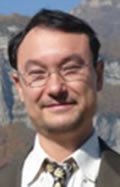 Emmanuel Buu, IVES, France Emmanuel Buu, IVES, France
In 2006, Emmanuel BUU has co-founded the Interactivity Video and Systems
(IVèS) company with Didier Chabanol and Pascal DUPUY, two persons with
more than 10 years of experience in the telecommunication industry. IVèS
is a private company that develops, host and operate value added
services on live video communication and on Total Conversation (voice,
video and realtime text). IVèS puts a strong emphasis on standards and
on creating services that are really useful for people. IVèS was
selected by Websourd and Significant to provide the technology basis for
their video relay services. Emmanuel BUU has previously worked for
eServGlobal Inc. in various positions ranging from software developer,
support manager to solution architect, participating in many technical
projects with telco operators in Africa in the Middle-East including the
Egypt's number one mobile operator: Mobinil. He graduated as
telecommunication engineer in l'Ecole Nationale Supérieure des
Télécommunications in Paris and acquired through field experience a
significant on technical matters pertaining to telecommunications. |
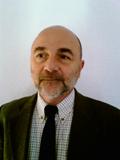 Nuno Encarnação, OFCOM
Switzerland Nuno Encarnação, OFCOM
Switzerland
Nuno Encarnação got his degree as an Engineer (University of Lisbon,
1975) and started his activity in telephony with ITT (Portugal). After 4
years he went through a 4 years shared experience between air traffic
control radars (Portugal) and Quality Assurance (Switzerland, creating
and leading a department for electronic components).
In 1984 he joint back the telephony world (Ascom, Switzerland). He
created and led a department in charge of the engineering and product
management of import and export telecom terminals and successfully
concluded a 3 year education on management aspects of enterprises.
His experience on worldwide standards brought him to the Federal Office
for Communications (end of 1992). Soon after he started a regular
activity within ITU and ETSI standardization, particularly in quality,
transmission, terminals, interfaces and services.
In 1996 he initiated a 9 years chairmanship of the ETSI body on
terminals and access in a period where the European authorities strongly
focused on the creation of a single European market for terminals. This
was largely achieved due to the great standardization progress made by
this ETSI group. Since then he also participated in many working groups
related to regulatory, policy and administrations issues, many of them
in areas related to standards.
His present focus is in communications services, e-Inclusion and
e-Accessibility, convergence(s) in the ICT sector, Quality of Service. |
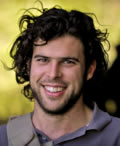 Pablo Romero-Fresco, Roehampton University
Pablo Romero-Fresco, Roehampton University
Pablo Romero Fresco is a Senior Lecturer in Audiovisual Translation at
Roehampton University, where he teaches Dubbing, Subtitling and
Respeaking. He also teaches at the MA on Audiovisual Translation at
Universidad Autònoma de Barcelona. He is the author of Subtitling
through Speech Recognition: Respeaking (St Jerome). He is a member of
the research group Transmedia Catalonia, for which he has coordinated
the subtitling part of the EU-funded project DTV4ALL
(http://www.psp-dtv4all.org/), a European research project exploring the
possibility of providing a common standard for Subtitling for the Deaf
and Hard of Hearing. |
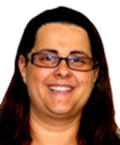 Dani Fried, Australian Communications Consumer Action Network,
Australia Dani Fried, Australian Communications Consumer Action Network,
Australia
The Australian Communications Consumer Action Network (ACCAN) is
Australia’s peak body representing consumers of communications services,
including telecommunications, broadband and broadcasting. Dani’s
responsibilities at ACCAN include researching and preparing submissions,
writing ACCAN’s Disability Action Plan and representing consumers with
disability in a number of forums. Before joining ACCAN in June 2010,
Dani was Customer Service Coordinator with the National Relay Service,
responsible for managing complaints and other feedback from consumers.
Dani previously worked with the Deaf Society of New South Wales, the
Royal Institute for Deaf and Blind Children, the Australian Caption
Centre (now Media Access Australia) and the Australian Network on
Disability. Dani is an Auslan/English interpreter who recently stepped
down from a position on the Executive Committee of the Australian Sign
Language Interpreters Association. Dani holds a BA majoring in
Government from the University of Sydney, and a Master of Translating
and Interpreting from Macquarie University. |
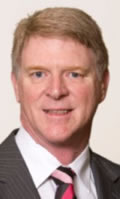 Sandy Gilliland, Australian Communications Exchange,
Australia
Sandy Gilliland, Australian Communications Exchange,
Australia
Mr Alexander (Sandy) Gilliland was appointed to the position of Chief
Executive Officer by the Board of Directors of the Australian
Communication Exchange (ACE) in July 2007 and commenced the role on
August 13 2007.
Mr Gilliland has held senior state, national and international positions
in the Not for-Profit sector for over 20 years, in particular serving as
CEO of Diabetes Australia Queensland (DAQ) for 10 years, CEO of the
Royal Blind Foundation (RBF) for 4 years and more recently as National
General Manager of Strategy with Vision Australia. Each of these
organisations is a complex mix of commercial and service oriented
activities in the disability sector.
In his 10 years with DAQ, he grew the business from one central
administration and service centre in Brisbane to a sustainable,
multi-dimensional, decentralised service to all of Queensland with 30
retail and service outlets and sub-agencies as far north as Thursday
Island.
In 2005 he was elected as the Chairman of the Australian Blindness
Forum, the national peak body representing the blindness sector to
Government, an office he retained until resigning to take up the
position as CEO with ACE.
Over the past 20 months, he has led ACE through a consolidation phase
with substantial constituency-focussed growth planned for the coming 3
years. Partnerships and collaborations within the sector have been a
strong feature of ACE in 2008 and 2009, driven by a revitalised Vision
and Mission.
He has successfully facilitated the restructure of Government
departments, state and national NGOs through the development and
implementation of appropriate change management processes. He has also
controlled multi million dollar mergers and acquisitions in both the
for-profit and not-for-profit sectors. |
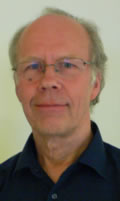 Gunnar Hellström, Omnitor, Sweden
Gunnar Hellström, Omnitor, Sweden
Gunnar Hellström specializes in Telecommunications and Information Technology accessible to people with disabilities. He is the founder of Omnitor, Sweden, devoted to product development and service provision in this area. Through a series of engagements, Gunnar has provided international leadership and been instrumental for the creation of numerous international standards for accessible telecommunication services, including real-time text conversation in multimedia, the Total Conversation concept, text telephony, wireless multimedia and video communications for sign language and lip-reading. Gunnar served as Rapporteur for Accessibility to Multimedia within ITU-T Study Group 16 during 1997-2004, and has performed many projects for development and policy creation in accessible communication. Emergency service access for people with disabilities being an essential function, has always been included in the goals in Gunnar's standardisation and development work, as for example in adding the accessibility aspects for people with disabilities in the emergency service standards work in IETF. He has also led the development of "Allan eC," a multi-media communication product that optimizes personal communication, among others for deaf users, making benefit of some of the standards he has been working with. Currently, Gunnar serves as Technical Coordinator in the REACH112 European project for improving personal communication and access to emergency services for people with disabilities.
|
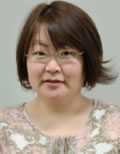 Chiori Hori, NICT, Japan Chiori Hori, NICT, Japan
Chiori Hori received the B.E. and the M.E. degrees in electrical and
information engineering from Yamagata University, Yonezawa, Japan in
1994 and 1997, respectively. She received her Ph.D. in Science and
Engineering at Tokyo Institute of Technology (TITECH) in March 2002.
From April 1997 to March 1999, she was a Research Associate at the
Faculty of Literature and Social Sciences of Yamagata University. She
was a Researcher in NTT Communication Science Laboratories (CS Labs) at
Nippon Telegraph and Telephone Corporation (NTT), Kyoto, Japan from
April 2002 to March 2004. She was a Project Researcher at InterACT in
Carnegie Mellon University (CMU) in Pittsburgh from April 2004 to March
2006. She is currently a senior researcher at Spoken Language
Communication Laboratory at National Institute of Information and
Communications Technology (NICT), Kyoto, Japan since 2007. She was the
editor of ITU-T recommendations F.745 and H.625 which were approved in
2010. She has received the Awaya Kiyoshi Science Promotion Award from
the Acoustical Society of Japan (ASJ) in 2001, Paper Award from the
Institute of Electronics, Information and Communication Engineers
(IEICE) in 2003, 24th TELECOM System Technology Award from the
Telecommunications Advancement Foundation (TAF) in 2009, and
International Cooperation Award from the ITU Association of Japan
(ITU-AJ) in 2011. She is a member of the IEEE, the ASJ, and the IEICE. |
Christopher Jones, Acceque UK and co-convenor of the ITU JCA-AHF
In the early 1970’s, as a local leader of Breakthrough Trust, Mr.
Christopher Jones raised funds to develop a small network of 24
Teleprinters as precursor to text telephones for the local deaf people
enabling them to communicate across the telephone network for the first
time in their lives. Within a couple of years, this led to the
development of UK’s second local Text Telephone Relay Service, many
years before the National Text Telephone Relay Service. He is a member
of TAG for over 20 years – Telecommunication Action Group, an umbrella
organisation consisting of members of deaf organisations in the UK to
further enhance access to electronic communications. During 1980’s, Mr.
Christopher Jones was involved in European multimedia projects: - Europa
Lingua Surda, Horizon and PETRA. In 1987, he received the Churchill
Fellowship into multimedia and language development for deaf children.
From 1991 to 2007, as Vice President he joined Teletec International,
later as Managing Director – distributor of text telephones. In 2000, a
captioned telephone relay service was started until its closure in 2007
due to lack of government funding towards a range of alternative relay
services. From 2007 onwards, Director, AccEquE Ltd, a consulting company
into enhanced accessibility and equality into electronic communications
for deaf, deafened, deaf blind and hard of hearing people. In 2010, I
was appointed as Co-Convenor of the JCA-AHF at ITU. |
Jim Kyle, University of Bath, UK
Professor Jim Kyle, Centre for Deaf Studies, University of Bristol has
been involved in work with Deaf and hard of hearing people for over 30
years.
He has published extensively on the issues arising and has developed a
special focus on telecommunications. He has managed a number of large
scale national and European projects and is currently the UK lead in the
REACH112 project. As a psychologist, he is particularly interested in
the human impact and the extent of engagement by people in this new
technological initiative. |
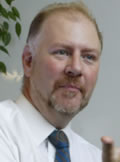 Jeff McWhinney, SignVideo, UK
Jeff McWhinney, SignVideo, UK
Jeff McWhinney is the Managing Director of Significan’t, a social
enterprise, working to use the latest technological advances to improve
access to services for the deaf sign language communities in the UK. The
company’s main development - the SignVideo Contact Centre - has won a
number of prestigious awards for innovation. SignVideo is an online real
time video call centre that allows deaf sign language users, to
communicate with hearing people effectively and naturally, via a fully
qualified sign language interpreter.
Jeff McWhinney is a recognised leader within the UK’s deaf community for
the depth and breadth of his expertise and, as the CEO of the BDA, led
the campaign resulting in the long fought for recognition of British
Sign Language as an official language in the UK in 2003 and in 2004 for
Irish Sign Language in Northern Ireland (his homeland).
As a deaf sign language user himself, Jeff is fully aware of the issues
faced – lack of access to information and services and lack of awareness
in society generally – and is therefore proud to bring interpreter
provision into the 21st century through SignVideo. Jeff has a wealth of
experience on deaf and videoconferencing issues, has written a number of
articles and is widely consulted on these subjects in the UK and abroad. |
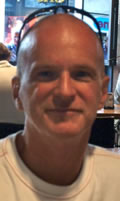 Thor
Nielsen, nWise AB, Sweden Thor
Nielsen, nWise AB, Sweden
I have been involved in the relay industry as technology provider for
over 15 years. Communication in a cross-cultural environment has been a
link trough my life journey: I was born in Brazil, completed high school
in Denmark, graduated from University in the US and Sweden, worked at
the United Nations’ Security Council, and started to work in the area of
alternative telecommunication for the deaf and hard of hearing in 1996.
Since 2001 I have worked as the account manager for the major text and
video relay services in Northern Europe. During the past 10 years my
focus has been to ensure that legacy services and new solutions can be
delivered via the internet.
I have worked in the telcom sector as an account manager and partially
in charge of product development for the major European relay services
that have embraced this technology shift, first at Netwise and further
on at Ericsson, and now as partner and one of majority owners of nWise. |
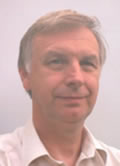 Bill Pechey, Rapporteur Question 26/16 and Workshop chairman
Bill Pechey, Rapporteur Question 26/16 and Workshop chairman
Bill Pechey is Rapporteur for Question 26/16 (Accessibility). He has participated in the meetings of ITU-T Study Group 16 and its predecessors since 1978, for several years as head of the UK delegation. He takes a special interest in the problems faced by deaf people in using telecommunications services. He is vice-chairman of TAG (www.tagcomm.org.uk), a UK charity which campaigns for better services for deaf, deafblind and hard-of-hearing people. He is also a trustee of Stagetext, another charity which provides captioning services in arts venues.
|
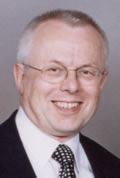 Mike Pluke, ETSI and Castle Consulting UK
Mike Pluke, ETSI and Castle Consulting UK
Mike Pluke left British Telecom, where he led internal and external user
interface standardization activities, to form the user experience
consultancy Castle Consulting Ltd
He is Vice-Chairman of the European Telecommunications Standards
Institute (ETSI) Human Factors committee and has led and participated in
many Specialist Task Forces developing standards and guides covering a
wide range of user-related issues within ICT. Key themes of this ETSI
work have included accessibility, personal identification, user profiles
and privacy in ICT.
Currently Mike leads an ETSI Specialist Task Force producing a standard
to support the European Commission Mandate M 376 on "European
Accessibility Requirements for Public Procurement of Products and
Services in the ICT Domain". |
 David
Rose, DAART, UK David
Rose, DAART, UK
I became very frustrated with UK’s TRS because it’s such a poor quality
service, and not even universal never mind equivalent. I realized that
only because I often fly to California, USA to stay there, and when I am
there, I always make great use of their TRS in a variety of ways.
Indeed, I am always amazed at the choice, flexibility, and accessibility
that an US deaf person has in making almost real-time phone connections
with business, family, and friends. I will talk about the standards of
handling of phone calls as well as these are quite impressive.
In USA, I saw the rapid development of TRS over the years since 2002 to
present usage of range of mobile appliances and apps.
This has led me to work with two other people to start up DAART Campaign
of which I will briefly mention.
I look forward to sharing my experiences with you on the 25th November,
2011. |
Christian Vogler, Gallaudet University, USA
Dr. Christian Vogler is the director of the Technology Access Program.
He is a principal investigator within the Rehabilitation Engineering
Research Center (RERC) on Telecommunications Access, with a particular
focus on the accessibility of web conferencing and telecollaboration
systems. In his role at the RERC, he is involved in bringing consumers
and industry together on accessibility issues, as well as developing
prototype technologies for improving the accessibility of such systems.
Prior to joining TAP in 2011, Dr. Vogler has worked on various research
projects related to sign language recognition and facial expression
recognition from video at the University of Pennsylvania; the Gallaudet
Research Institute; UNICAMP in Campinas, Brazil; and the Institute for
Language and Speech Processing in Athens, Greece. He also runs the
DeafAcademics mailing list, a loose network of deaf and hard of hearing
researchers all over the world. Dr. Vogler passionately believes that
deaf and hard of hearing people have only scratched the surface of what
is possible with the Internet and mobile communication technologies, and
that the most exciting technological developments are still to come. |
|
|
|



